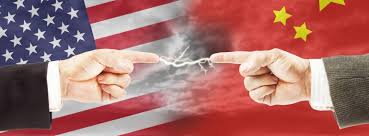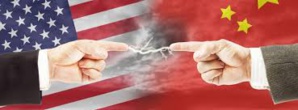At a time of heightened tension over North Korea’s nuclear ambitions, Trump's move, the first direct trade measure by his administration against China, is believed unlikely to prompt near-term change in commercial ties.
The White House and U.S. industry groups say that China's policies on intellectual property are harming U.S. businesses and jobs and U.S. Trade Representative Robert Lighthizer will have a year to look into whether to launch a formal investigation into the matter.
An unidentified spokesman of China's Ministry of Commerce said in a statement that the United States should not destroy principles of multilateralism, abide by its World Trade Organization pledges, respect objective facts and act prudently.
"If the U.S. side ignores the facts, and disrespects multilateral trade principles in taking actions that harms both sides trade interests, China will absolutely not sit by and watch, will inevitably adopt all appropriate measures, and resolutely safeguard China's lawful rights."
The ministry warned that any U.S. action to damage ties would "harm both sides trade relations and companies" and said the United States should "treasure" the cooperation. The ministry added that for protections for intellectual property, China was continuously strengthening its administrative and judicial regulations.
Longstanding problems for several U.S. administrations have been China's failure to crack down on intellectual property theft and its policy of forcing foreign companies to turn over technology to Chinese joint venture partners.
The value of theft of intellectual property by China could be worth as much as $600 billion, Trump administration officials have estimated. Without being seen to cave to pressure under the threat of reprisals, China would be allowed to discuss some of the issues raised by Washington by the long lead time, experts on China trade policy said. China has insisted it rigorously protects intellectual property and has repeatedly rebuffed attempts by previous U.S. administrations to take action on its IP practices.
The U.S. investigation is a unilateralist "baring of fangs" that will hurt both sides, said state news agency Xinhua. While expecting a decision on how to move forward from the administration in 60-90 days, Trump's memo is only the beginning of the process, said Jacob Parker, vice president of China operations at the U.S.-China Business Council.
"I think it will be much faster than a year," Parker said.
He added that a better way to get China to address the IP issues would be coming to terms on a bilateral investment treaty.
"This isn't a surprise. Our companies have been honing their crisis communications and internal planning processes since the election. The rhetoric that came up during the campaign led them to take proactive action then. They are prepared, aware and ready for these types of actions going forward."
Just as Trump is asking it to put more pressure on North Korea to give up its nuclear program, the investigation is likely to cast a shadow over U.S. relations with China, its largest trading partner.
If China were more aggressive in reining in North Korea, he would be more amenable to going easy on China over trade, Trump has suggested. The issue of North Korea should not be liked to the issues of trade with the United States, China has said.
(Source:www.cnbc.com)
The White House and U.S. industry groups say that China's policies on intellectual property are harming U.S. businesses and jobs and U.S. Trade Representative Robert Lighthizer will have a year to look into whether to launch a formal investigation into the matter.
An unidentified spokesman of China's Ministry of Commerce said in a statement that the United States should not destroy principles of multilateralism, abide by its World Trade Organization pledges, respect objective facts and act prudently.
"If the U.S. side ignores the facts, and disrespects multilateral trade principles in taking actions that harms both sides trade interests, China will absolutely not sit by and watch, will inevitably adopt all appropriate measures, and resolutely safeguard China's lawful rights."
The ministry warned that any U.S. action to damage ties would "harm both sides trade relations and companies" and said the United States should "treasure" the cooperation. The ministry added that for protections for intellectual property, China was continuously strengthening its administrative and judicial regulations.
Longstanding problems for several U.S. administrations have been China's failure to crack down on intellectual property theft and its policy of forcing foreign companies to turn over technology to Chinese joint venture partners.
The value of theft of intellectual property by China could be worth as much as $600 billion, Trump administration officials have estimated. Without being seen to cave to pressure under the threat of reprisals, China would be allowed to discuss some of the issues raised by Washington by the long lead time, experts on China trade policy said. China has insisted it rigorously protects intellectual property and has repeatedly rebuffed attempts by previous U.S. administrations to take action on its IP practices.
The U.S. investigation is a unilateralist "baring of fangs" that will hurt both sides, said state news agency Xinhua. While expecting a decision on how to move forward from the administration in 60-90 days, Trump's memo is only the beginning of the process, said Jacob Parker, vice president of China operations at the U.S.-China Business Council.
"I think it will be much faster than a year," Parker said.
He added that a better way to get China to address the IP issues would be coming to terms on a bilateral investment treaty.
"This isn't a surprise. Our companies have been honing their crisis communications and internal planning processes since the election. The rhetoric that came up during the campaign led them to take proactive action then. They are prepared, aware and ready for these types of actions going forward."
Just as Trump is asking it to put more pressure on North Korea to give up its nuclear program, the investigation is likely to cast a shadow over U.S. relations with China, its largest trading partner.
If China were more aggressive in reining in North Korea, he would be more amenable to going easy on China over trade, Trump has suggested. The issue of North Korea should not be liked to the issues of trade with the United States, China has said.
(Source:www.cnbc.com)






